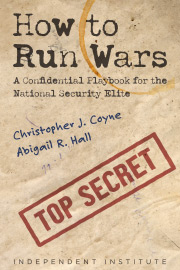Critical parts of the USA Patriot Act are about to expire. The reauthorization bill moving through Congress, the USA Freedom Act, has sparked controversy on both sides of the political aisle and within the civil-libertarian community, rekindling debates that began more than a decade ago. Now is the chance to implement much-needed reforms, including reforms to a provision not expiring: the one authorizing National Security Letters (NSL).
The Patriot Act originally went into effect a mere 45 days after the attacks on Sept. 11, 2001, granting increased powers to law enforcement in the name of preventing further acts of terrorism. Following a heated debate in Congress in 2009, President Obama signed a one-year extension and eventually extended the law for another four years.
The bill he signed renewed a variety of controversial components, including provisions allowing broad surveillance of U.S. citizens and mass data collection. Among other surveillance tools, the Patriot Act allows the Department of Justice and FBI to use and abuse NSLs. These warrant-like letters, issued without the approval of a judge, allow the FBI to obtain personal information, including phone and email records, credit information and banking history. National Security Letters are not limited to use on foreign persons within the United States. Moreover, those targeted are likely not individuals with connections to questionable foreign organizations, but those who have publicly spoken out against government policies, attended a political protest, or written something on social media that raises so-called “reasonable suspicion.” Between 2003 and 2006 the government issued nearly 200,000 NSLs.
Some proponents of the Patriot Act and broad use of National Security Letters claim that such tools are necessary to prevent another terrorist attack. The available data, however, show clearly that these tactics have done precisely nothing to combat terror. The Justice Department reports that of nearly 150,000 NSLs issued between 2003 and 2005, only 53 cases, or 0.03 percent, were referred to prosecutors. Of these offenses, 64 percent related to fraud or money laundering. The remaining 36 percent were immigration violations. None of these cases resulted in the prosecution of terror suspects. Moreover, the Justice Department’s inspector general reported Thursday that no major terror cases have been broken by the use of mass data collection.
Not only has the Patriot Act failed to achieve the stated goals of catching terrorists, but it also permits an alarming degree of government secrecy. For example, Americans subject to National Security Letters are prohibited from revealing even this fact to anyone else.
The First Amendment problem with such broad gag orders is obvious. According to the American Civil Liberties Union, which has represented several NSL victims, “[T]here is nothing to stop the government from engaging in broad fishing expeditions, or targeting people for the wrong reasons, and then gagging Americans from ever speaking out against potential abuses of this intrusive surveillance power.”
Between the time the Patriot Act was implemented and today, it has faced several legal challenges, including three cases against National Security Letters. Despite numerous claims, hearings and a finding by a U.S. district court judge that the NSL provisions violate the Constitution, the FBI is undeterred.
While the Freedom Act would make some positive changes, it would not eliminate or fundamentally change current NSL procedures. The suggested “reforms” would only require government officials to seek judicial review of NSL gag orders, but only if asked by the targets, who might be intimidated into silence. So the government could still overstep its constitutional boundaries.
It is time to reform the Patriot Act and take a much-needed look at National Security Letters and other domestic surveillance tactics used by local and federal authorities. For starters, law enforcement should be required to obtain a judge’s permission before engaging in surveillance. This would work to prevent at least some of the fishing expeditions undertaken by the government in recent years. Second, the gag orders protecting government abuses should be eliminated. Individuals subjected to surveillance and search should be allowed to state they are being targeted and to openly discuss their situation with whomever they wish. In these ways, we may begin to take real steps to reform a program that is not only ineffective, but that also erodes our civil liberties.








